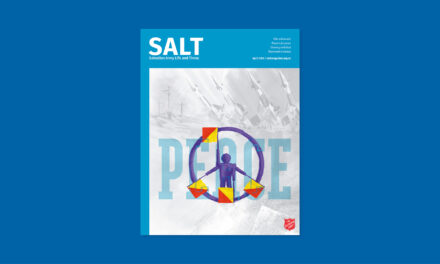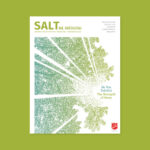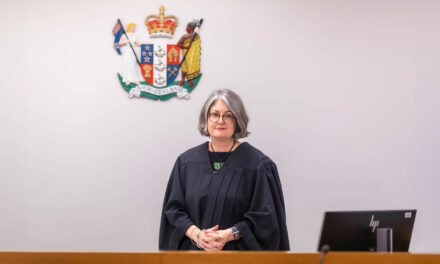
Order of Service

In a world where the demands on our time and energy are at an all-time high, it benefits us to ensure we have our priorities in order. Jules Badger challenges us to self-examination to ensure we can sustain our service.
Jesus said: ‘Come to me, all you who are weary and burdened, and I will give you rest. Take my yoke upon you and learn from me, for I am gentle and humble in heart, and you will find rest for your souls. For my yoke is easy and my burden is light’ (Matthew 11:28–30).
I vividly remember sitting in class at the Bible College of New Zealand (now Laidlaw College) as a 21-year-old, when the lecturer asked: ‘What is the purpose of our existence?’ At the time I was a new Christian attending the Faith Factory (Waitakere Central Corps) in West Auckland. I had just been enrolled as a soldier of The Salvation Army, having recently completed soldiership classes. The first thing that came to my mind was The Salvation Army motto, ‘saved to serve’. I called out, ‘service!’ The lecturer pointed to me and said, ‘I’m so glad someone said service!’ I felt myself puff up—I was right! But my puff was quickly deflated as he explained that the modern church seemed intent on favouring service and mission over discipleship and spiritual formation—to its detriment.
Essentially the lecturer was leading us into a discussion of the Westminster Catechism which says, ‘the chief end of (wo)man is to glorify God and enjoy him forever’. But what did that mean? As a young Salvationist I was conflicted because, if you’re anything like me, it’s mission and service that stir your soul and inspire you to go and do—to make a difference in the world. For many of us, glorifying God is synonymous with service and mission—fighting the good fight, standing against injustice and making Jesus known through our actions. But therein lies the rub for us activists: enjoying God for who God is—being with God—can easily get squeezed out. In class that day we were being challenged to consider the context and conditions for mission. It felt like a chicken and egg situation: which comes first, the Great Commission, loving others; or the Greatest Commandment, loving God?
Great, greater, greatest
As The Salvation Army, we have an incredible, others-focused mission statement: caring for people, transforming lives, and reforming society by God’s power. It’s bold and it’s beautiful. And yet, interestingly, the first of our He Waka Eke Noa values is ‘Put Jesus First’. So which is more important: mission in God’s name, or our relationship with Jesus? The Great Commission (love others) or the Greatest Commandment (love God)?
Grammatically we all understand that ‘greatest’ supersedes both ‘greater’ and ‘great’. All three are adjectives, but ‘greatest’ is the superlative adjective. Synonyms for greatest include supreme, unsurpassed, of the highest quality, the most excellent and matchless. And yet sometimes we put the Great Commission (go and make disciples) ahead of the Greatest Commandment (love the Lord your God), forgetting that the success of the Great Commission depends on the Greatest Commandment. If good is the enemy of great, great must also be the enemy of greatest.
I love that the first statement in The Salvation Army Officer’s Covenant says, ‘I will love and serve God supremely all my days’. The order of service is clear—love God and then serve God. The first ‘I will’ statement of the Soldier’s Covenant says, ‘I will be responsive to the Holy Spirit’s work and obedient to his leading in my life, growing in grace through worship, prayer, service and the reading of the Bible’. Again, the order of service is very clear: love for God and waiting upon the leading of the Holy Spirit trumps service in God’s name every time—the latter flowing from the former. Our service and work for God must stem from our love and worship of God, not the other way around—not if our service is to have any substance or significance, let alone sustainability.
For or from God
Counsellor, supervisor, author and sought-after speaker Richard Black (founder and director of Mind Health), explains that ‘the commandment to love the Lord your God with all your heart, soul, mind and strength comes first before loving your neighbour, not just because of the order of importance of the subject in each, but also because it is the order of necessity. In John 15, Jesus says that we are to remain in him and remain in his love, otherwise we cannot bear fruit. That is not to say that we are incapable of doing anything without God, but rather our actions must be an extension and expression of being in him for our actions to have any substance in his eyes.’
Richard Black expands further, alerting us to Jesus’ warning in Matthew 7:23. ‘Any actions and achievements coming from efforts that were not the result of remaining in him and his love—to those who had achieved much in his name—Jesus said, “Truly, I never knew you”. Interestingly, according to Augustine, the Greek phrase can be used interchangeably with, “you never knew me”. The necessary reciprocity of our relationship with God reveals itself.’
Richard Black adds that in Galatians 5:6, Paul emphasises this point by conveying to us that the only thing that counts is faith expressing itself through love. ‘John also tells us that the love we show, we can only show because God (who is love, 1 John 4:8) first loved us (1 John 4:19). So, any action or service must be an expression of first being in God’s love and loving God back.’
This is a massive challenge to our capable, competent self-sufficiency in a world that values outcomes, pragmatism and achievement. It is not that the latter is not important, but rather that it must come as an expression from our being in Christ and our love for him and from him, to have any value in the eyes of the One who created us and whom we follow.
Are we working for him or from him? Our challenge as disciples is to remember that and live accordingly, keeping Jesus in his rightful place and service in its.









